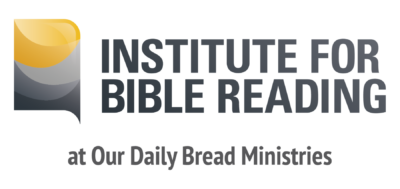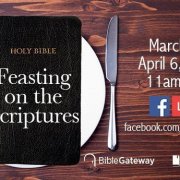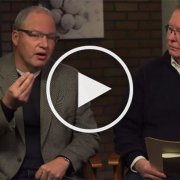From “No Bible” to “Know Bible” Part 2: Feasting on the Bible
Editors Note: From “No Bible” to “Know Bible” is a 6-part series on the path toward great Bible engagement. Click here to read Part 1.
What does it mean to receive the Bible on its own terms? Dynamic, living Bible engagement happens when a community:
- has good access to a well-translated text presented in its natural literary forms,
- regularly feasts together on whole literary units understood in context,
- understands the overall story of the Bible as centered in Jesus, and
- accepts the invitation to take up its own role in God’s ongoing drama of restoration through the power of the Spirit.
When the Scriptures are received on their own terms like this they can once again become God’s speech act—instructing, revealing, convicting, judging, comforting, healing, and saving with all their intended power.
Part 2: Feasting on The Bible
As we explored last week, the first step to deep Bible engagement happens when a community has good access to a well-translated text presented in its natural literary forms. The first half of this statement is now true for a fair part of the world (though the translation need remains for many). The second part of this statement is becoming a reality for more and more people as publishers increasingly realize the immense value in Reader’s Bibles.
Elegant reader’s editions give people the opportunity to regain something that’s been missing from our Bible practices for nearly five centuries: reading the Bible in its natural, uncluttered form. Reader’s Bibles reintroduce us to Bible feasting.
Bible feasting is reading whole books, taking in the literary units that the Bible’s first authors and editors created and intended for their audiences to read as complete works.
Bible feasting is reading the Scriptures as the kind of literature they were inspired to be.
Bible feasting is reading the Bible without distractions and interruptions. It is reading deeply, at length, and with more understanding.
Bible feasting recognizes the natural literary breaks that existed before chapter and verse numbers inartfully imposed their foreign structure on the Bible. The best kind of in-depth Bible reading is not just reading more (though it is that too!) — it’s reading better because we are seeing what the Bible really is.
Bible feasting is reading all those long-overlooked books like Judges, Zephaniah, Philemon, and Habakkuk and discovering the crucial pieces they contribute to the overall biblical narrative. Bible feasting is taking 35 minutes to hear the entire crashing chord of Paul’s anguished plea for suffering, servant leadership in 2 Corinthians. Bible feasting is seeing a whole sequence of parables in a Gospel and asking why they were put together that way. It’s reading all five of those sad songs of devastation and loss in Lamentations, allowing those few words of hope right in the center to hit us with their full force:
Yet I still dare to hope
when I remember this:
The faithful love of the LORD never ends!
His mercies never cease.
Great is his faithfulness;
his mercies begin afresh each morning.
In short, Bible feasting reacquaints us with an undiminished Bible. Eating the Bible whole is essential to receiving the Bible that God actually gave us. Feasting is the thing that gets us back on track to big, deep Bible engagement. If the Bible is going to be our story and form our lives the way it was meant to, then there is no shortcut to simply reading more of it.
So long as we merely snack on the Bible, taking preselected bits and pieces out of their bigger literary settings, we will never know the real Bible nor receive all its intended gifts.
Snacking on Bible verses allows us to set our own agenda, to hear only what we want to hear. Feasting introduces us to the complete message—good encouraging words and good hard words—that we so desperately need.
Snacking on Bible verses allows to set our own agenda, to hear only what we want to hear.Click To TweetThere is a crisis in Christian identity in the world today. Too many who claim the status of Christ-follower allow this or that ideology to be the primary force that shapes and forms them. Too many Christians are getting the story of their lives from somewhere other than God’s Scriptures. If we are to know who we really are, and the story we are supposed to be living, then we have to re-immerse ourselves in these holy words—songs, stories, letters, and prophecies—that God gave us for a purpose.
There is a complete meal for us in the Bible. Feasting is the only way we’ll ever discover it.
Continue to Part 3: Reading Together








